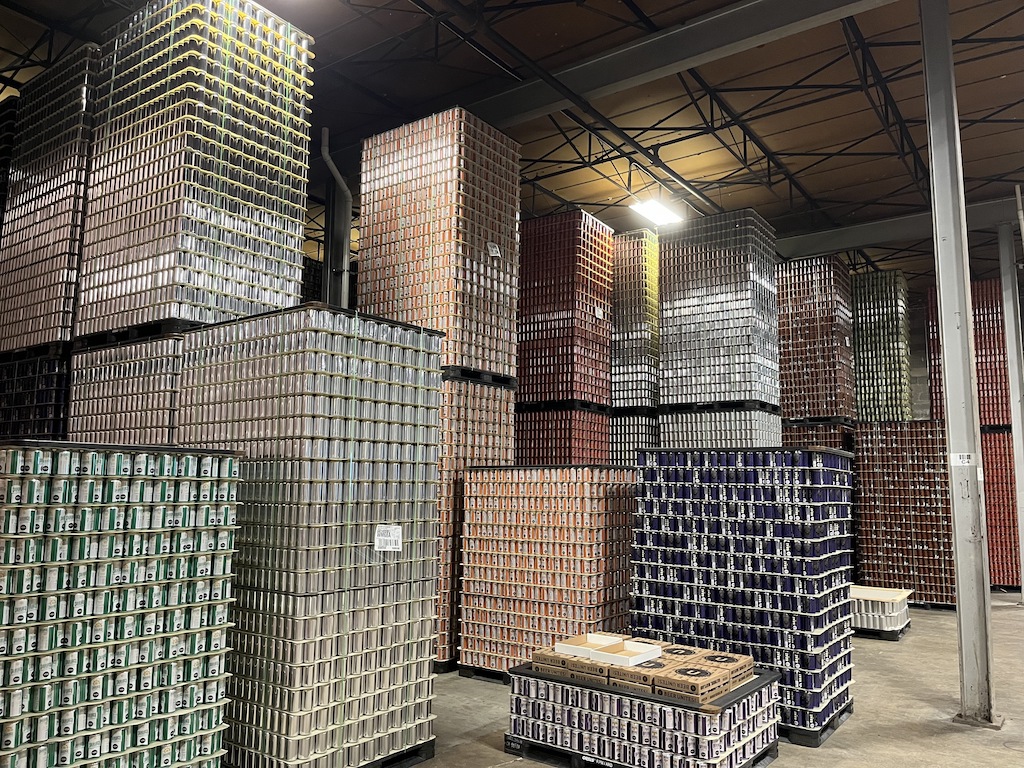BALTIMORE — Maryland breweries have yet to fully recover from the economic effects of COVID-19, and the Trump administration’s tariffs have added another wrinkle to their bounce-back efforts.
President Donald Trump has ordered a minimum 10% tariff on all imports to the United States. But aluminum — fabricated into beer cans and one of the largest costs for craft breweries — is under a 25% tariff.
“(Tariffs are) going to certainly be a negative for most Americans as far as costs increasing, not just in beer, but across everything,” said Adam Benesch, cofounder of Union Craft Brewing. “When you talk about a 25% increase in price, most businesses, whether it’s beer or outside of beer, are not equipped to be able to absorb that increase in cost.”
About half of all aluminum used in America is imported, with the vast majority coming from Canada, according to Reuters. This includes cans manufactured by American companies and supplied to Union Craft and many other breweries.
Finding a new can supplier is not a simple process, either. Accounting for the change in artwork and can printing plates, Benesch said it would take about a year to make the switch.
“(Aluminum tariffs are) going to significantly increase one of our largest costs of goods sold,” Benesch said. “Us and virtually any brewery and any company that uses aluminum in America, that comes from Canada.”

While the aluminum tariffs may be the biggest cost hit, some Maryland breweries also import raw materials — including hops and malt — as well as other products from abroad.
Some brewers have already begun to find domestic alternatives to their imported items. Hugh Sisson, the CEO and founder of Heavy Seas Beer, Maryland’s largest craft brewery, told Capital News Service that he recently canceled an order of tap markers from China after the price increased 135%.
Benesch and Sisson said they have not yet felt the full effects of the tariffs, but said all costs will likely be passed on to consumers. In preparation, Benesch ordered enough cans to last the company until late summer, with the expectation that a six-pack of beer will cost about a dollar more once tariffs trickle through the supply chain.
“We’re seeing in real time how destructive Trump’s tariff taxes are to our neighborhood taprooms,” Rep. Nikema Williams, D-Georgia, and co-chair of the Small Brewers Caucus, told CNS. “Trump’s tariffs are a tax on all of us, small brewers included. Whether it’s barley, cans, kegs, or other industry equipment, Trump is driving up the cost of doing business—and it could cost us our favorite local crafters as well.”
But Sisson said the biggest effect on business will come in the form of consumer habits.
“(Tariffs have) completely shaken the confidence of the American consumer,” he said. “I expect the luxury goods market to be adversely affected, and whether or not craft beer is considered a luxury good or not, that remains to be seen, but I do expect there to be people tapping the brakes in terms of a lot of their overall expenditures.”
Additionally, craft beer is heavily dependent on restaurants, which have experienced negative effects from a shrinking economy in the first quarter of this year. McDonald’s and Chipotle each reported their worst quarter since the middle of the COVID pandemic, perhaps serving as a marker for consumers’ approach to eating out.
Restaurants and breweries also have not fully recovered from the pandemic. More breweries closed than opened in the United States last year for the first time since 2005. There were 335 brewery openings and 399 closures in 2024, bringing the total to 9,736, according to the Brewers Association, a trade association that tracks independent breweries in America.
In Maryland, three major breweries — Guinness Open Gate Brewery, Flying Dog Brewery and DuClaw Brewing — shut down operations in the last two years. Guinness Open Gate Brewery still operates a visitor center, a taproom and restaurant at its Relay, Maryland, location; the brewery also continues to make experimental beers in small batches for the taproom. Flying Dog ended its Frederick, Maryland, operations after it was purchased by another company and brewing was moved to New York. DuClaw’s Arundel Mills brewery was shuttered after it was bought by another company and production was moved to New Jersey.
Sisson predicts the tariffs will result in even more closures for breweries, who are already battling a shrinking market, which he attributes to the legalization of cannabis and decline in alcohol consumption among younger consumers.
“We’re going to see more consolidation and more closings,” Sisson said. “It is an economic cycle, I expect things will stabilize, I just don’t think we’ve gotten to the low yet.”


You must be logged in to post a comment.